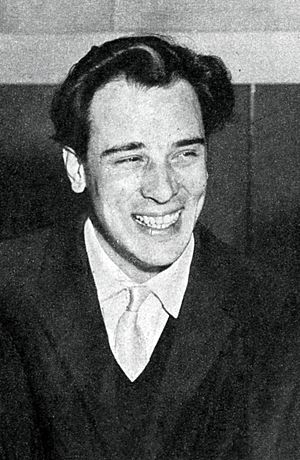Riz Ortolani facts for kids
Quick facts for kids Riz Ortolani |
|
|---|---|

Ortolani in 1955
|
|
| Background information | |
| Birth name | Riziero Ortolani |
| Born | 25 March 1926 Pesaro, Kingdom of Italy |
| Died | 23 January 2014 (aged 87) Rome, Italy |
| Occupation(s) | Composer, conductor, orchestrator |
Riziero Ortolani (born March 25, 1926 – died January 23, 2014) was a famous Italian composer, conductor, and orchestrator. He was best known for writing music for movies and TV shows. He created music for over 200 films and television programs during his career, which lasted more than 50 years.
Around the world, he was very well known for his music in certain types of movies. These included "mondo" films (which were like shocking documentaries), "giallo" films (Italian mystery thrillers), horror movies, and Spaghetti Westerns (Western movies made in Italy). His most famous song is "More." He wrote it for the well-known film Mondo Cane. This song won a Grammy Award for Best Instrumental Theme in 1964. It was also nominated for an Academy Award for Best Original Song. Many famous singers later covered the song, including Frank Sinatra and Andy Williams.
Ortolani won many other awards for his work. He received four David di Donatello Awards (like Italy's Oscars). He also won three Nastro d'Argento Awards and a Golden Globe Award for Best Original Song. In 2013, he received a special Lifetime Achievement Award. This award honored his amazing career in music.
Early Life and Musical Beginnings
Riz Ortolani was born on March 25, 1926, in Pesaro, Italy. He was the youngest of six children in his family. His father, who worked for the postal service, gave Riz a violin when he was just four years old. Later, after a car accident injured his elbow, Ortolani switched to playing the flute.
He studied music at a special school called the Conservatorio Statale di Musica "Gioachino Rossini" in his hometown. In 1948, he moved to Rome and started working with the RAI orchestra. He also played as a musician in the Italian Air Force orchestra. Before he started writing music for movies, he even formed his own jazz band. He also traveled to the United States to play jazz music in Hollywood.
In 1956, Ortolani married Katyna Ranieri, who was also a talented singer.
A Career in Film Music
In the early 1950s, Riz Ortolani was a key member of a popular Italian jazz band. His first big movie music job was for the 1962 film Mondo Cane. This movie was a type of documentary that showed unusual things from around the world. The main song from this film, "More," became a huge hit. It won him a Grammy award and was nominated for an Oscar.
Because the music for Mondo Cane was so successful, Ortolani started getting jobs to score films in England and the United States. Some of these movies included The Yellow Rolls-Royce (1964) and Buona Sera, Mrs. Campbell (1968). He also wrote music for the 1972 film The Valachi Papers, which starred Charles Bronson.
Ortolani wrote music for more than 200 films in total. He worked on many different types of movies. These included German Westerns like Old Shatterhand (1964). He also scored many Italian mystery thrillers (called "giallo" films) and Spaghetti Westerns. His music was featured in films like Il Sorpasso (1962), Africa Addio (1966), and Day of Anger (1967). He also composed for the first series of the popular Italian TV show La piovra (1984). In his later years, he often worked with Italian director Pupi Avati.
Ortolani's music has continued to be popular even after his films were released. His songs have been used in the soundtracks for video games like Grand Theft Auto: London 1969 (1999). They have also appeared in famous movies such as Kill Bill: Volume 1 (2003), Kill Bill: Volume 2 (2004), Drive (2011), and Django Unchained (2012).
In 2013, he received the Lifetime Achievement Award. This award recognized his incredible contributions to film music throughout his long career.
Death
Riz Ortolani passed away on January 23, 2014, in Rome, Italy. He was 87 years old.
See also
 In Spanish: Riz Ortolani para niños
In Spanish: Riz Ortolani para niños
 | DeHart Hubbard |
 | Wilma Rudolph |
 | Jesse Owens |
 | Jackie Joyner-Kersee |
 | Major Taylor |

